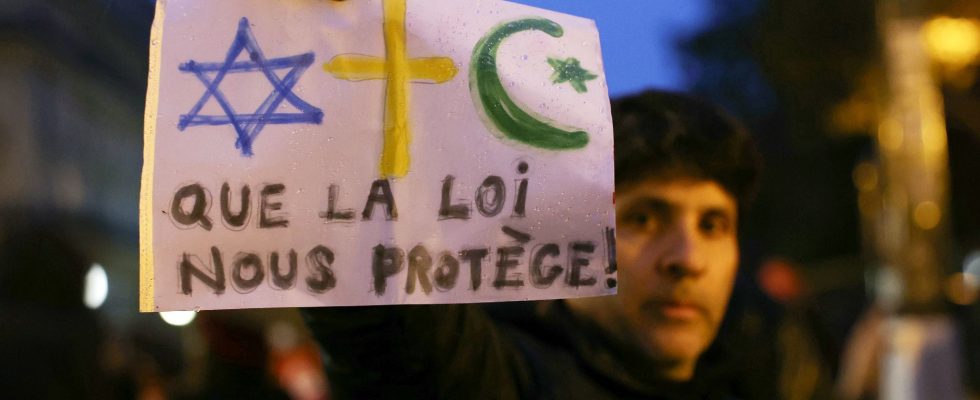A four-fold increase in one year: the number of anti-Semitic acts recorded in France jumped last year, to 1,676 compared to 436 in 2022, according to a Crif report which deplores an “explosion” after October 7, the date of Hamas attacks against Israel.
Never had such a level been reached, Yonathan Arfi, president of the Representative Council of Jewish Institutions of France (Crif), told AFP, recalling that “we had a few dozen acts per year in the 90s , a few hundred over the period 2000-2022”.
In six out of ten cases (57.8%), the acts recorded last year were attacks on people (physical violence, threatening words and gestures, etc.) rather than on property, according to this report compiling figures. listed by the Ministry of the Interior and the Jewish Community Protection Service (SPCJ). But these figures reflect “only part” of anti-Semitic acts, those which were the subject of a complaint or a report to the police, recalls Crif.
“Threatening words and gestures”
In more than 40% of cases, it involved “threatening words and gestures”. And if they were mainly committed in the private sphere (32%) and on public roads (20.4%), 7.5% were recorded on the internet.
Another worrying point for the Crif, 12.7% of the acts took place in a school environment, the majority of which were in college. “We are witnessing a rejuvenation of the perpetrators of anti-Semitic acts. School is no longer a sanctuary of the Republic,” he laments.
“For the first time in a long time, the coming generations are more susceptible to anti-Semitic prejudices than previous generations,” explains Yonathan Arfi, identifying “three fuels” for this phenomenon: “hatred of Israel, Islamism and conspiracy.”
“Catalyst”
In a country which is home to the largest Jewish community in Europe (around 500,000 people), Crif notes an “explosion” (+1000%) of anti-Semitic acts after October 7. During the three months that followed, their number “equaled that of the previous three years combined”.
“October 7 served as a catalyst for hatred, activating latent anti-Semitism, and disinhibiting action,” said Yonathan Arfi, according to whom the vision of massacred Israeli civilians played a triggering role in this phenomenon.
The Hamas attack on October 7 on Israeli soil resulted in the deaths of more than 1,140 people, according to an AFP count based on official data. Israel launched a vast military operation which killed 25,700 Palestinians, according to a latest report from the Islamist movement’s Ministry of Health.
Already in 2012, after the attack on a Jewish school in Toulouse where three children and a teacher were killed by the radicalized delinquent Mohamed Merah, a 200% increase in anti-Semitic acts was noted. The increase was 300% after the jihadist attack on the Hypercacher supermarket in 2015. “After October 7, we could have had an effect of empathy, a vaccine effect, it was the opposite,” sighs the president of Crif.
Thus, from around forty each month over the summer period, anti-Semitic acts rose to 563 in October, 504 in November and 175 in December.
The “lack of social disapproval of anti-Semitism”
A decline at the end of the year “difficult to analyze” for the president of Crif, who remains cautious: “there were the holidays, undoubtedly a drop in intensity…” “We remain very far from the figures for before the 7th”, he underlines, deploring the “lack of social disapproval of anti-Semitism”.
Recalling that some may have been tempted to hide what could designate them as Jewish – a mezuzah on the door, a name on the mailbox… – Yonathan Arfi worries: “the risk in the end is that of “an invisibility of Jews in the public space. It is a victory that there is no question of serving to anti-Semites.” Because “anti-Semitism is a question that goes beyond Jews, and says something about the societies where it develops,” he insists.
Crif specifies that the report was produced “thanks to feedback from police stations and gendarmes, then qualified during monthly discussions with the Ministry of the Interior and the SPCJ”.
